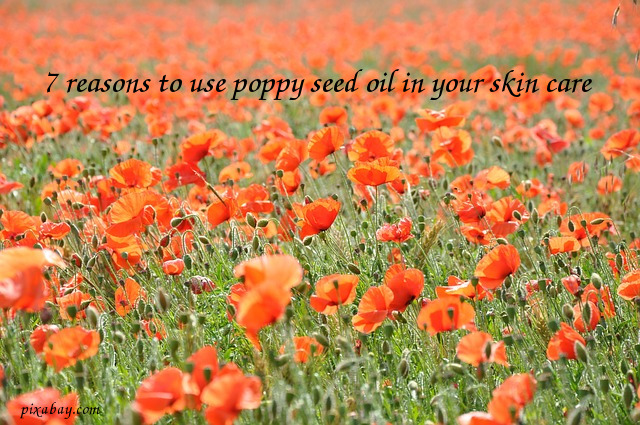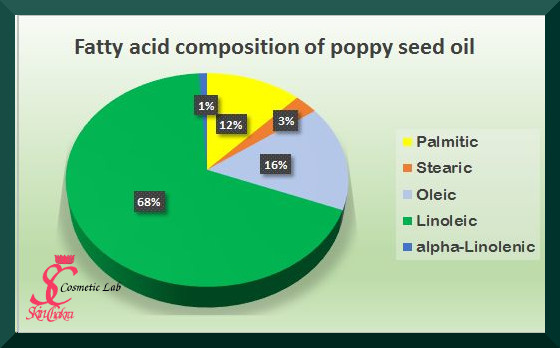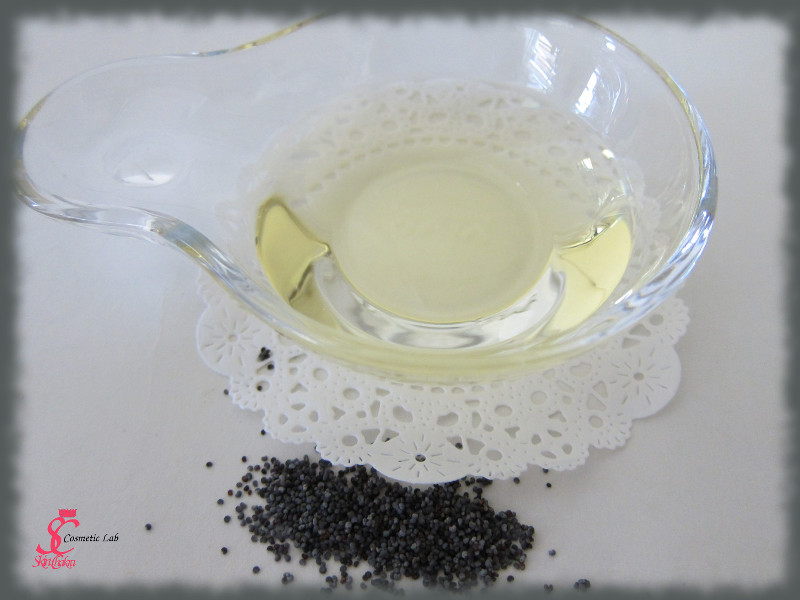
Mittwoch, 30. März 2016
7 good reasons why you should use poppy seed oil in your skin care products
Poppy seed oil (Papaver somniferum seed oil) is one of those plant oils which hardly receives the praise and attention it deserves.
Poppies belong to the eldest plants on earth. The seeds found in the middle Europe date back to 4600- 3800 B.C.
The oil is pressed (by cold or hard pressing) from the seeds of the plant with the cold process oil being superior in taste, quality and scent. It has a light yellow colour with a decent nutty scent.
Although poppy seed oil is intensively used in pharmacy, in painting and in wood care (like linseed oil), its applications in skin care is not as intensive as this oil really deserves.
I can remember the astonishment and fascination of all the cosmetic chemists I met during one of my visits to the United States about two years ago (in 2014). For my demonstrations I packed poppy seed in my suitcase and everywhere I made a demonstration, attending cosmetic chemists were fascinated with poppy seed and its skin feel. It came to the point that as I was back in Germany, the company that have originally invited me to the US, asked me to send them 500 ml of the oil for one of their demonstrations during a business exhibition.
Anyway, to make the long story short, I want to emphasize a few points why you should consider applying poppy seed oil in your “natural and organic” skin care.
Let me first explain that the composition and the fatty acid profile (as well as the olfactory characteristics) of the oil varies with the seeds. The following diagram is the average of the oil derived from most common and widely available seeds:
Poppy seed oil has an average saponification number between 189-197 and an Iodine value of 133-197 which is relatively high meaning the oil has a limited shelf-life (compare it with olive oil: 87-90 and avocado oil 75-95).
Poppy seed oil is an excellent oil in soap making (up to 15%) and imparts hardness to the soap.
Its skin feel is quite remarkable. It has a very light skin feel but does not vanish quite fast into the skin and has a relatively low absorption rate without any unpleasant greasiness.
Here are the 7 most important reasons why you should apply poppy seed oil in your skin care products, specially products for mature, dry, barrier damaged and sensitive skin:
-
The light skin feel
Poppy seed oil contains almost 40% LLL (tri-linoleic acid) in the triglycerides spectrum. This is why this oil has such a nice silky skin feel despite the considerable concentration of palmitic acid
-
The relatively neutral colour and decent scent which would not overpower your emulsion, balm or oil blend
-
High concentrations of palmitic acid and linoleic acid provide the oil with barrier repair properties. Poppy seed oil is an excellent oil for barrier damaged, mature, dry and choppy skin
-
Slow absorption of the oil (despite the light skin feel) makes the oil a “protective” and “covering” skin care ingredient. It doesn’t immediately disappear
-
Unsaponifiables, basically phytosterols add to the protective and barrier repair of the oil
-
High concentrations of linoleic acid (an omega-6 fatty acid) impart to anti-inflammatory properties of the oil. This is an excellent choice for barrier damaged and sensitive skin
-
Although opium, morphine and heroin are derived from poppy seeds (opium is derived from the unripe seeds and heroin is synthetically made from opium) there are no opiates present in the oil and you don’t need to worry about having opiates or alkaloids in your skin care.
If these reasons could not convince you to apply poppy seed in your skin care products, go and try this amazing oil for yourself but please don’t forget to share your experience and impressions with us.
One more thing:
Poppy seed oil has a high iodine value.
I’ve applied it in skin care products without any problems of rancidity and oxidation (considering the fact that the shelf-life of “natural” and organic skin care is about 9-12 months)
Try to use freshly prepared oil and from reliable suppliers. Keep the oil in a fridge or in a cold and dark storage room. Add 0.5% Tocopherol or 0.05% Rosemary CO2 extract to the oil as you receive it to protect the oil from rancidity.
Try to use poppy seed oil in cold process formulations or if you apply it in hot process (emulsions, balms and butters), try to add it during the cool down phase.
Thank you for being here and for sending me your comments and photos. Don't hesitate to post your questions and comments. I really enjoy your participation in our Facebook discussions.
Be Happy and have fun



